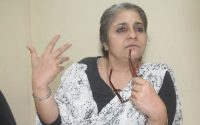Mosque can be built at distance from disputed Ayodhya site: Shia board to Supreme Court
Source – indianexpress.com
Questioning the locus standi of the Sunni Waqf Board in the Ayodhya dispute, the Shia Central Waqf Board of Uttar Pradesh on Tuesday told the Supreme Court that it will be better to “avoid” the “closeness” of mandir and masjid and suggested that the latter be built at a “reasonable distance from the… birthplace of Maryada Purshottam Sri Ram”. “Shia Central Waqf Board is of the view that the closeness of place of worship that is Masjid and Mandir of the two litigating denominations should be avoided in as much as both the nominations using loudspeakers tend to disturb the religious performances of each other often leading to conflicts and acrimony. Answering respondent is of the view that to bring quietus, Masjid can be located in Muslim-dominated area at a reasonable distance from the most revered place of birth of Maryada Purshottam Sri Ram,” the board said in a counter-affidavit filed in the apex court.
The counter, filed by board chairman Syed Waseem Rizvi, said he “firmly believes that the efforts of the Shia Central Waqf Board will definitely bring about an amicable settlement solution of the dispute and assurance of a new era for both the largest denominations to live in peace and harmony”.
The Shia board claimed that Babri masjid was a Shia waqf and not a Sunni one. The counter said that inscriptions on the mosque proved that it was built by Mir Baqi, who was a Shia, and the last Mutawalli (trustee) was also a Shia. As such, only the Shia board had the right to take decisions about it, Rizvi said. The Shia board move comes three days before the Supreme Court is scheduled to start hearing appeals against the 2010 order of the Allahabad High Court dividing the 2.7-acre disputed land between Ram Lalla, Sunni Waqf Board and Nirmohi Akhara. A special three-judge bench of the apex court will take up the appeals on August 11.
The Shia board’s affidavit has little legal significance, say those following the case, but it could render the case for the masjid/mandir more confusing and dilute claims made by the Sunni Waqf Board regarding the masjid. Zafaryab Jilani, advocate for the All India Muslim Personal Law Board and Sunni Waqf Board, said, “There was a 1936 Waqf Act in UP, and a survey of waqf properties in the state between 1941 and 1945. In 1946, a decision was announced that the land on which the Babri Masjid once stood belonged to the Sunni Waqf Board.” Sources said the UP Shia Waqf Board had been wooed by both CM Yogi Adityanath as well as RSS functionary Indresh Kumar and today’s affidavit could be connected to those meetings.
As reported by The Indian Express on June 15, 2017, the UP government had announced dissolution of Shia and Sunni Waqf Boards in the wake of corruption charges against them.



